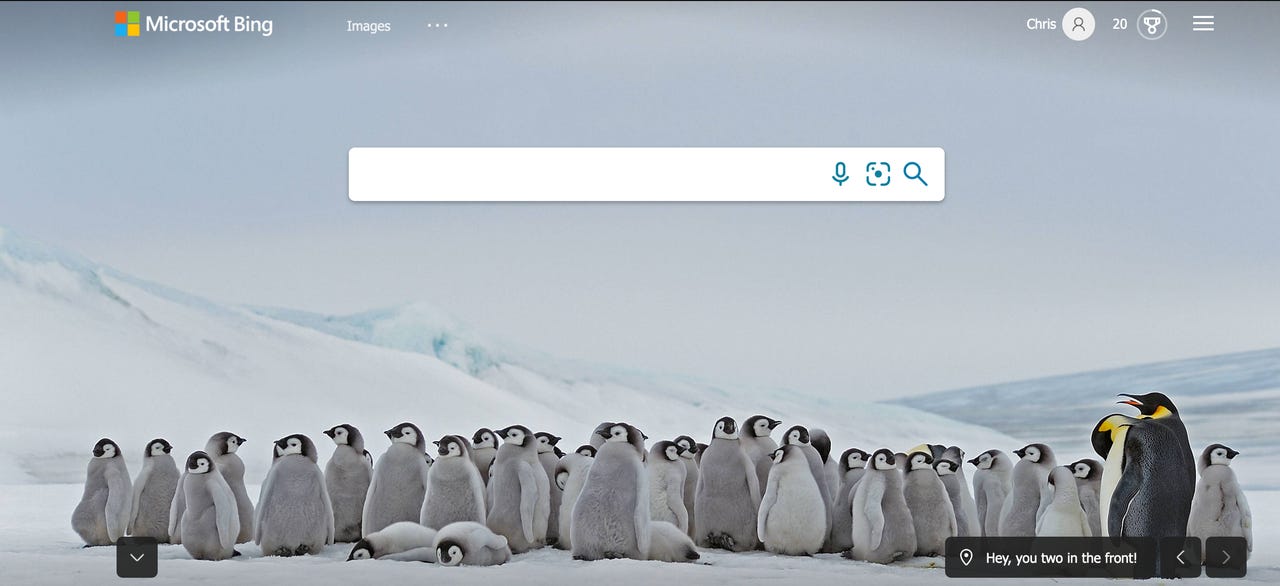Microsoft's latest surprising move just might scare Google

The new Microsoft Bing. A gift from branding experts.
It happened quietly.
More Microsoft
Some of the most powerful happenings do.
Here was a blog post, discreetly placed, with seemingly anodyne intentions. It was entitled: "Microsoft Bing: The search engine that gives back."
When you search on Bing, you can now give a little money to your chosen charity through a new idea called Give With Bing.
But wait, that headline. Microsoft Bing? Microsoft Bing? Could it be that Microsoft is now rebranding its search engine so that those who don't know now realize it's a Microsoft product?
Naturally, I rushed to Bing. This isn't something I've often done in my life. But there it was, in the top left-hand corner. A Microsoft logo and the words: Microsoft Bing.
Oddly, the blog post itself referred to the search engine mostly as merely Bing. Yet it was written by Jordi Ribas, who titles himself CVP of Microsoft Bing Engineering. He explained: "Starting today, you will see a shift in product to Microsoft Bing, which reflects the continued integration of our search experiences across the Microsoft family."
A shift in product? What can that possibly mean?
I pondered awhile. Is the quiet intention here to slowly disappear the Bing brand and create Microsoft Search as the alternative to Google Search?
Microsoft wouldn't officially comment. However, I poked around at Microsoft and the company line seems to be no, no, no, this is just a, um, naming update. Which could never be confused with a rebrand.
This is all about Microsoft being overtly the lead brand and names like Bing being relegated to sub-brand status.
It's worth wondering, though, why Bing is called Bing at all. When Bing was belatedly launched in 2009, it was regarded as a faintly silly name. But faintly silly names were exactly what most tech companies desperately embraced. We're silly, we're goofy, we're techy, we'll make a fortune.
Equally, the Microsoft brand wasn't exactly beloved at the time. Even by many at Microsoft. Somehow, it had a history of clumsy aggression rather than finesse. Friendly, it was not.
The progress made since Satya Nadella became CEO has been palpable. With both his personal attitude and some far wilier marketing tactics, the Microsoft brand has become one of the more respected in the world. Respected for something akin to warmth and decency, rather than merely the company's ability to shove questionable software down the gullets of the world's unsuspecting.
Over time, this has allowed Microsoft to add its brand to more of its product names -- Office 365 becoming Microsoft 365, for example.
Any time I've actually looked at Bing results, they've always seemed far inferior to Google's. Older somehow, and more reasonless. And Bing as a brand name is irrevocably slight.
Let's dream a little. Let's imagine that Microsoft decides to quietly disappear the Bing name and let its search product become Microsoft Search.
Immediately, that would -- or, at least, should -- command more respect as a brand. Indeed, Microsoft Search already exists as a service within Office and Windows.
If Redmond decided to invest a little more financial and intellectual capital into the new Microsoft Search, this might prove to be a more realistic competitor to Google's overbearing dominance. (Currently, some estimates suggest Bing has less than a 3% share of the world's search engine market and less than 7 percent in the US.)
Moreover, if Microsoft could make the same promises it's made with its impressive new Edge browser -- better speed and privacy -- it really might make some consider Microsoft Search as a viable alternative. So that when Microsoft makes it the default in every single piece of its software that people use, fewer will want to change the default back to Google.
Oh, I know this will likely never happen. It's just a corporate branding exercise, right?
Then again, Google deserves a little more to worry about and Microsoft does enjoy being competitive.
Let's remember, too, another little rumor that recently wafted by -- that Apple is contemplating a search engine.
